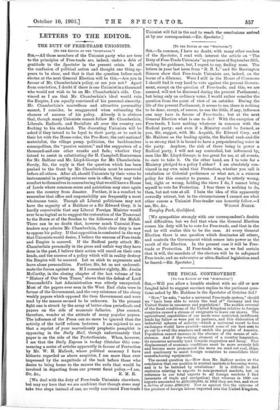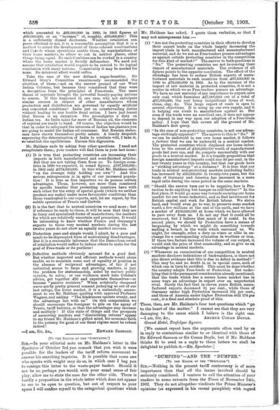THE FISCAL CONTROVERSY.
[TO TIM EDITOR OF THE "SPECTATOR."]
you allow a humble student with no old or new
fangled label to suggest succinct replies to the pertinent ques- tions asked by Mr. Haldane in the Spectator of October 3rd ?
"How:' he asks, "under a universal Free-trade system," should we "have been able to retain the lead of" Germany and the United States in resources and population? The sudden reversal of the fiscal conditions of the United Kingdom relative to foreign countries caused a stream of emigrants to leave our shores. The agricultural capabilities of our lands were restricted, indifferent lands lay fallow or were put to pastures, and this dislocation of industrial spheres of activity—which a universal resort to free exchanges would have averted—caused some of our best men to go out to swell the numbers and enrich the peoples of America. Population cannot increase in the absence of the means of sub- sistence. And if the working element of a country languishes, its resources naturally tend towards stagnation and decay. This displacement of economic conditions must be more severely felt and become more pronounced the more we send out coal, ships, and machinery to assist foreign countries to consolidate their manufacturing equipments.
The second question is,—How does Mr. Balfour arrive at the conclusion that our position in neutral markets is becoming worse, and is to be bettered by retaliation ? It is difficult to And statistics relating to exports to non-protected markets, but on reference to our total exports to all foreign markets I find (accounts of trade and navigation) that whereas in 1890 our exports amounted to X230,000,000, in 1902 they are less, and show a decline of some .8866,000. Now as against this the outcome of the produce of foreign labour imported into the United Kingdom, which amounted to .£63,000,000 in 1890, 'in 1902 figures at 299,000,000, or an "increase" of, roughly, X36,000;0001 This is a sufficiently dismal disclosure. Whether retaliation can prove effectual or not, it is a reasonable assumption that it is a method to arrest the development of those colossal combinations and Cartels whose operations enable them, by manipulations of their home markets, to elbow us out in neutral places, other things beine. equal. No such Combines can be worked in a country where the being market is fiscally defenceless. We need not assume that retaliation would require to be carried to its logical conclusion with many nations. Conceivably it may be needed for none. Its deterrent effect would suffice.
Take the case of the now defunct sugar-bounties. Sir Edward Grey's Committee unanimously recommended the abolition of these,—not on the narrow ground of our West Indian Colonies, but because they considered that they were a derogation from the principles of Free-trade. The mere threat of reprisals brought the powerful bounty-paying nations to reason. If this happened in one case, why not anticipate similar success in respect of other manufactures whose production and distribution are governed by equally artificial and concocted conditions ? India put on countervailing duties without leading to any hostile fiscal action. I have just learnt that Russia is an exception. She promulgates a duty on Indian tea. As India takes far more of Russian oil, the elements of reprisal are ready to hand. Of course, the objection would be that in order to safeguard the interests of Indian tea-planters you are going to mulct the Indian oil consumer. But Russian states- men have shown themselves pretty astute. A timely despatch expressing the determination of India to retaliate will, I take it, re-establish the equilibrium. Excuse this digression.
Mr. Haldane ends by asking four other questions. I need not recapitulate them; your readers will find them in your last issue :
(1) It is true that protecting countries are increasing their imports in both manufactured and semi-finished articles. But they are not taking them from us. To foreign coun- tries in 1890 we exported, in round figures, 2197,000,000 ; in 1902 only £174,000,000. Is this what Mr. Haldane calls " on the average fully holding our own" ? And this serious retrogression is in spite of our increased popula- tion ! It is true as free importers we do possess certain advantages. These, however, are more than countered by specific treaties that protecting countries have with each other for the entry of special goods (which we neither produce nor make) under more favourable conditions than those vouchsafed to our exports, and, let me repeat, by the subtle operation of Trusts and Cartels.
(2) It is the fact that to neutral countries we send more ; but if reference be made to these, it will be seen that they are in fancy and specialised forms of manufacture, the markets for which are relatively uncertain and precarious. It would be interesting to know whether France and Germany's exports to these very neutral markets during the last twelve years do not show an equally marked increase.
(3) Protection pure and simple would, I admit, be a poor and much-to-be-deprecated form of neutralising disadvantages. But it is a reasonable inference that the Damoclean sword of retaliation would suffice to induce others to make for the goal of Free-trade or its purlieus !
(4) Defective methods obviously account for a good deal. But whether improved and efficient methods would alone enable us to maintain some sort of equality of position in the absence of reciprocal advantages, of fair if not unlimited access to large and growing markets, is just the problem for statesmanship, aided by mature public opinion, to solve ; or our workmen must take Cobden's advice, get together 220 and expatriate themselves—or become "passive resisters." When artificially cheapened wares are by pretty general consent jockeying us out of our last refuge, the home market, it is a melancholy amuse- ment to see Mr. Haldane quoting with approval Professor Wagner, and adding " The hindrances operate evenly, and the advantage lies with us." On this computation we should encourage the foreigner to pile on the agony of Trusts, tariff barriers, so that the advantages may increase and multiply ! If this state of things and the prospects of narrowing markets and "diminishing returns" appeal to my friend Mr. Haldane's gifted mind, his economic faith in the potency for good of our fiscal regime must be robust indeed 1















































 Previous page
Previous page